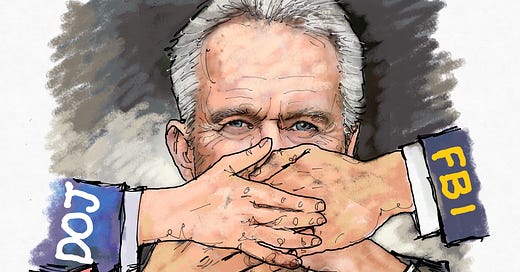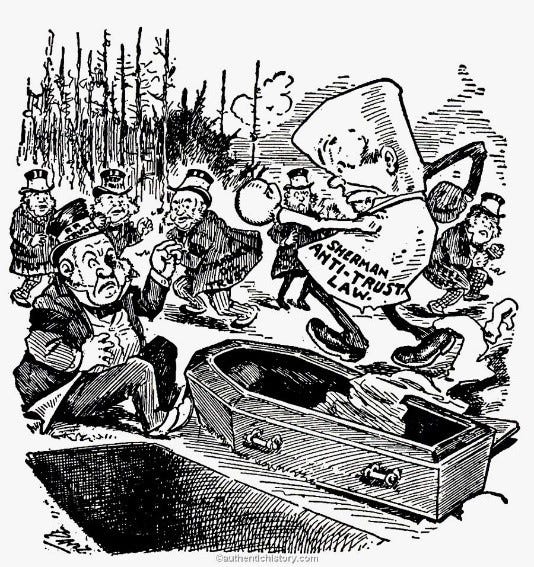Kennedy v. The Censorship Industrial Complex
RFK, Jr’s Antitrust Suit against the Trusted News Initiative Seeks to Protect the “Marketplace of Ideas”
For years, Robert F. Kennedy, Jr. has been systematically censored. Now that he is running for president on a platform that includes ending the proxy war in Ukraine and freeing Julian Assange, the effort to silence his voice has been ramped up. Fortunately, he is a skilled attorney, who knows how to fight back, and is accustomed to taking on powerful, corrupt entities.
Kennedy is currently challenging what has been dubbed the “Censorship Industrial Complex” with several different cases from two distinct legal angles: the defense of the First Amendment, and a more radical approach, drawing on to the Sherman Antitrust Act of 1890.
In Missouri v. Biden, which was consolidated with Kennedy v. Biden in July, the courts have so far sided with the Plaintiffs, who contend that their First Amendment rights were violated when the White House and government agencies “coerced” media companies to censor news that contradicted the administration's agenda. After a lower court ordered an injunction against the White House to stop its coercive tactics, the Biden administration appealed, but on September 8th, the Fifth Circuit Court of Appeals upheld the injunction. Although the White House responded by seeking a temporary stay against the injunction until September 22nd, the Defense has exhausted its arguments and, as TownHall reports, it seems likely that the courts will continue to uphold the right of free speech.
The argument in Missouri v. Biden centers on the government strong-arming private companies to become collusive state actors to censor social media discourse that challenges the state’s narrative; the state cannot legally infringe upon free speech.
In Children’s Health Defense v. Washington Post, the Plaintiffs argue that major corporate media companies have formed an unlawful trust against independent media. As with Missouri v. Biden, the merits of this case are well founded, according to Louisiana Attorney General Jeff Landry, who has added the state of Louisiana to the Missouri case.
In an amicus brief dated August 29, 2023, Landry offered support for the Plaintiffs in Children’s Health Defense v. Washington Post in their complaint against the Trusted News Initiative (TNI) for censoring and suppressing the Plaintiffs’ speech.
While the U.S. government is prevented by the First Amendment from censoring speech, a private media company can decide to deny anyone access to its platform. Kennedy, in his novel argument for the Plaintiffs against the TNI, invokes the Sherman Antitrust Act, which was passed “to protect trade and commerce against unlawful restraints and monopolies.”
The TNI is a group of media giants—namely The Washington Post, the BBC, The Associated Press and Reuters—who have formed an association with social media companies to more effectively censor speech that does not fit with their agendas. In this way, the TNI suppresses the news of their competitors. Because the lawsuit invokes antitrust law, the court’s decision should depend only on whether or not the Plaintiffs can show that the Defendants agreed to work together to take anti-competitive actions against them.
In his brief, Landry defends the decision to use “antitrust law as a vehicle to ensure a free and competitive press” and provides some history of antitrust legislation. As an alliance of numerous major news outlets, the TNI does indeed represent a conspiracy, according to Landry, to harm the public by denying them access to a diversity of opinions. Landry opines that the scope of the conspiracy is “breathtaking.”
Defending Kennedy’s case, Landry draws upon the analysis of David K. Million’s Washburn Law Journal article, The First Antitrust Statute. Landry notes that antitrust laws were not conceived merely to protect consumers from artificially high prices (as with the infamous Standard Oil case). Early antitrust legislation sought to preserve the autonomy of individuals in the marketplace of ideas. He claims antitrust laws are as much about individual freedom as economic issues.
Landry goes on to note that the Sherman Antitrust Act of 1890 was directed at the abusive practices of powerful railroad companies, and today we face a new but similar threat with “the alliance of powerful media conglomerates, who, like the railroads before them, have become a critical juncture linking Americans…”
The collusive actions of TNI, Landry continues, threaten the function of the free press. Landry argues that it is fitting to apply antitrust laws to protect the First Amendment, not just to the Commerce Clause, which gives the Federal government power to regulate commerce among the states.
Landry further notes that both the people are harmed when diverse perspectives are kept from them and public officials are harmed insofar as they are prevented from serving adequately when they do not have access to the diverse views of constituents: democracy cannot function without free speech. Quoting Story v. Jersey City, Landry writes, “Every legislator has a right to be informed of the views and wishes of all parties interested in the enactment of a law.” Therefore, he writes, constraining citizens’ available avenue for a petition of government “infringe[s]…the right of the people and of their representatives.” Landry also notes that, in its duty to protect the people, Louisiana has a “compelling interest in combating anticompetitive practices in the market for news information…where large news organizations enlist their social media allies to banish journalism at odds with their favored viewpoints.”
The TNI Defendants contend, referring confusedly to the Plaintiff’s argument in Missouri v. Biden, that the case against the TNI should be dismissed, implying government coercion would absolve the TNI of the responsibility of their own actions. In the August 29 brief, Landry calls their argument for dismissal “absurd.”
In another censorship case earlier this month, an equally confusing argument was made in an effort to discount the reality of state-sponsored censorship. In an emergency hearing in the case of Robert F. Kennedy, Jr. v. Google & YouTube, U.S. District Court Judge Trina L. Thompson denied Kennedy’s request for a temporary restraining order against Google/YouTube to prevent the tech giants from censoring him as he campaigns for president. Kennedy alleges that “under the state action doctrine,” the media companies are effectively state actors in carrying out the will of the state. However, Thompson argued that the government agencies and the media companies merely happen to have similar motivations for censoring speech and that there is no evidence that the government exerted pressure (positive or negative) on the media companies.
Thompson’s understanding of the situation contradicts Judge Terry A. Doughty’s July 4th ruling in connection with the Missouri v. Biden case (as well as what was discovered with the “Twitter Files,” i.e. House Judiciary Committee hearings on Twitter censorship). Doughty’s ruling found that government officials have been violating the Constitution by asking the online firms to suppress certain kinds of information. According to Doughty, the evidence submitted to the court "depicts an almost dystopian scenario."
In his brief, Landry also notes that whether acting on their own initiative or under pressure from government, the Trusted News Initiative cannot escape the charge of violating antitrust laws, insofar as the parties agreed to work together against the Plaintiffs. If successful, this case could set a major precedent for protecting the rights of citizens against powerful corporate interests.









I'm still frustrated by the people who are not even aware that censorship is occurring.
Great approach. We need to use anti-trust laws more vigorously to break up corporate control.